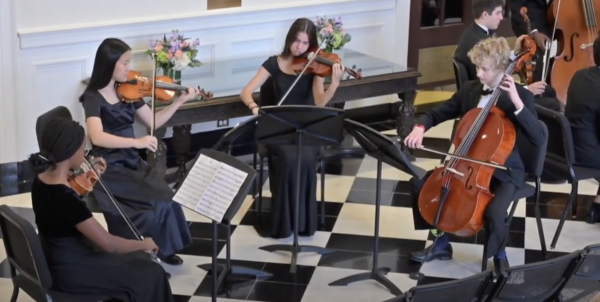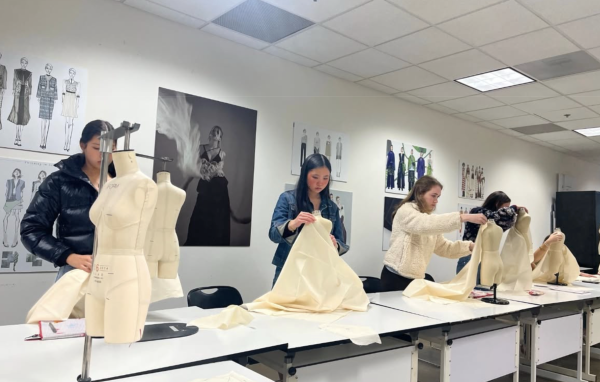Writing Fellows aim to improve Upper School writing
It is not easy to write the perfect research paper for history class, create a work of poetry to submit to the Scholastic writing contest, or revise the college essay to your dream school. To help aid students facing writing predicaments such as these, the Writing Center is open to everyone in the Upper School.
The Writing Center, directed by English teachers Jennifer Dracos-Tice and Mario Chard, is a program run by trained students called Writing Fellows that is designed for students to work with the fellows on various writing pieces. Located in Askew 215, the Writing Center is open from Monday to Friday during every period and from Monday to Thursday after school from 3:30 to 5:00 p.m.
Originally, the Upper School English department, under the suggestion of Dracos-Tice, established the Writing Center five years ago in the basement of Askew. However, due to finances, scheduling conflicts, and the lack of student involvement, the center closed temporarily.
“After the original Writing Center closed, I later pitched the idea of creating a curriculum program for students who love writing and also a leadership program to bring the Writing Center back,” said Dracos-Tice. “Eventually, these ideas were combined into one program which is now the Writing Fellows program, where students can learn about creative writing and assist students with their own writing all in one course.”
Working in the Writing Center is one of the key components of the student involvement in the program.
“The Writing Fellows must serve in the center at least once a rotation per semester,” said Dracos-Tice. “One fellow even served 16 free periods, which is a lot more than she had to, but the fellows end up loving being in the Writing Center.”
Before working with students in the Writing Center, the fellows are first trained on how to efficiently and constructively advise students who schedule appointments in the center. Depending on the type of writing a student brings in, the fellows follow different protocols on how to most effectively help the student.
“I think the most specialized part of the writing fellowship program is working in the Writing Center. It is important to know how to effectively workshop a student’s piece and make sure they get the help they need without necessarily rewriting their piece,” said current Writing Fellow and senior Emma Hardymon. “A lot of times, specific students will come back to work with you multiple times, and it is great seeing how their writing improves between each period of time that they visit.”
Not only do the Writing Fellows work with students in the Writing Center, they also participate in a yearlong course that meets on Mondays and Wednesdays after school.
“For the classroom portion of the program, it is great because it actually forces you to write in a more focused environment, which helps develop your skills as a writer,” said senior and former Writing Fellow Alan Xu.
The course built into the Writing Fellows program counts toward a student’s elective credits. During the class time, the Writing Fellows work on a portfolio of their writing interests, with help and feedback from each other.
“Half of the portfolio that each fellow creates is based on what we learn about different types of writing in the classroom, and the other half is based on their personal interests, whether it be poetry, short stories, or any other form of writings,” said Dracos-Tice.
In order for a student to become a fellow, he or she must apply based on a recommendation from their English teacher, a role in a publication such as the Embryo and Evolutions magazines, and a genuine interest in creative writing. Additionally, the student is only eligible to become a fellow as a rising junior or a rising senior.
“I have always enjoyed creative writing. I started writing a novel during my sophomore year, so I knew that the Writing Fellow program would help me develop and improve on my creative writing skills,” said Hardymon. “We have learned many different genres of writing during the class time, whether it be poetry, short stories, or screenplays.”
Xu was a fellow during his junior year in the Upper School.
“For me, I saw the Writing Fellows program as an opportunity to explore a potential passion of mine in writing, so I decided to apply because of the combination of my interest in the program and the recommendation of my English teacher,” Xu said.
As a whole, the Writing Fellows program is not only rewarding for the students who take advantage of the Writing Center, but the fellows and the teachers involved in the program also benefit greatly from their varied experiences.
“Being a part of this Writing Fellows course is very rewarding because the fellows are so open and put their responsibilities as a priority,” said Dracos-Tice. “Watching how much agency the fellows have when they run the center is incredible. It is like watching professionals – they outshine all of my expectations.”
Whether experimenting with different types of writing in the classroom or individually workshopping with students in the Writing Center, the Writing Fellows program continues to impact many students in the Westminster Upper School.
“An anecdote from my experience as a fellow was being able to work on a college essay with a senior applying to a very selective school,” said Xu, who now manages the Westminster Online Writers (WOW) website. “I worked with her three or four times, and she actually got into the school, which was amazing for her. It is really rewarding to see people’s progress and what they get out of how you help them.”



